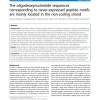Free Online Productivity Tools
i2Speak
i2Symbol
i2OCR
iTex2Img
iWeb2Print
iWeb2Shot
i2Type
iPdf2Split
iPdf2Merge
i2Bopomofo
i2Arabic
i2Style
i2Image
i2PDF
iLatex2Rtf
Sci2ools
111
click to vote
BMCBI
2010
2010
The oligodeoxynucleotide sequences corresponding to never-expressed peptide motifs are mainly located in the non-coding strand
Background: We study the usage of specific peptide platforms in protein composition. Using the pentapeptide as a unit of length, we find that in the universal proteome many pentapeptides are heavily repeated (even thousands of times), whereas some are quite rare, and a small number do not appear at all. To understand the physicochemical-biological basis underlying peptide usage at the proteomic level, in this study we analyse the energetic costs for the synthesis of rare and never-expressed versus frequent pentapeptides. In addition, we explore residue bulkiness, hydrophobicity, and codon number as factors able to modulate specific peptide frequencies. Then, the possible influence of amino acid composition is investigated in zero- and high-frequency pentapeptide sets by analysing the frequencies of the corresponding inverse-sequence pentapeptides. As a final step, we analyse the pentadecamer oligodeoxynucleotide sequences corresponding to the never-expressed pentapeptides. Results: We...
| Added | 09 Dec 2010 |
| Updated | 09 Dec 2010 |
| Type | Journal |
| Year | 2010 |
| Where | BMCBI |
| Authors | Giovanni Capone, Giuseppe Novello, Candida Fasano, Brett Trost, Mikelis G. Bickis, Anthony J. Kusalik, Darja Kanduc |
Comments (0)

